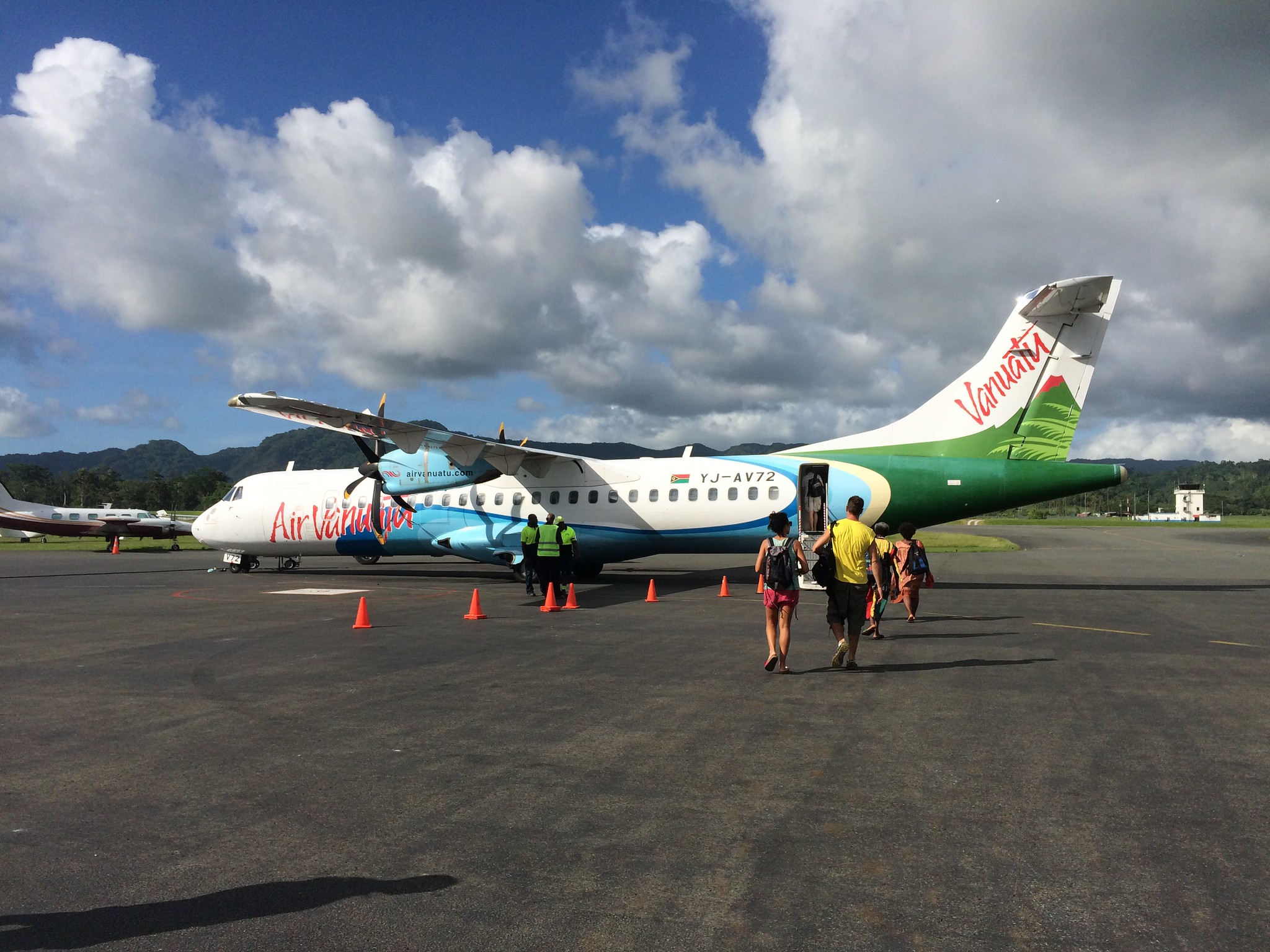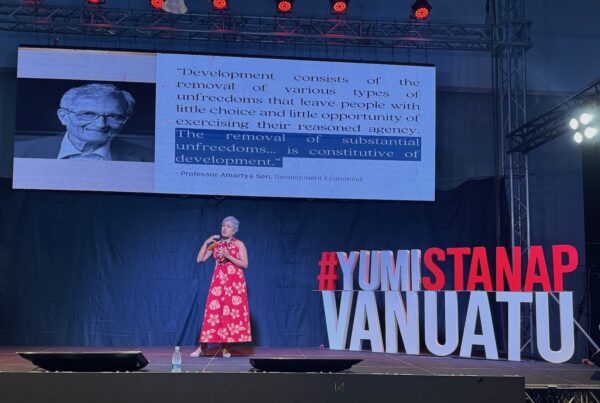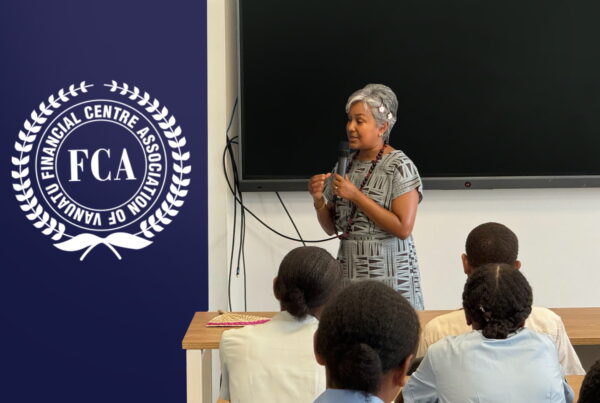By Peter Judge
In his maiden speech to Parliament following the National Elections in October 2022 and his election to the post of Prime Minister, Ishmael Kalsakau labelled the current status of Air Vanuatu as a ‘mess’.
He made the remarks during the appointment of the new Ministers at the Parliament Rotunda. PM Kalsakau acknowledged the national flag carrier was a source of national pride in Vanuatu, but had come under a lot of scrutiny in the past and recently.
“Our airline is a critical infrastructure in this country, and unless we remove political abuse, corruption and mismanagement, we will continue to ruin our national symbol,” he said.
Shortly after forming government, PM Kalsakau sought the assistance of the Australian Government to conduct an assessment of the state of the National Airline and a report was produced by a team of aviation experts with a number of recommendations
In September 2023, during a sustained period of political instability, Kalsakau was removed in a vote of No Confidence and Sato Kilman became Prime Minister. Kilman’s time as PM was also short lived and in another vote of No Confidence, was replaced in October 2023 by the current Prime Minister Charlot Salwai.
The initial findings of the Aviation Team from Australia was that the airline is:… “Fixable with Focus” if a key range of recommendations are adopted.
The recommendations covered the areas of Governance/Board Arrangements and the Financial Status of the embattled Airline.
To date, due to political instability and continual changes in the government, it appears that little has been done to address the underlying problems of our national airline. Yes there have been changes in the makeup of the Board, and an allocation of VUV 2bn was inserted in the 2024 Budget for new planes, but hard decisions affecting the long term financial viability of the airline have been left in the air. Aid donors who have indicated a willingness to assist have seemingly been met with inaction on the part of the Vanuatu government.
So why is Air Vanuatu so important to the Vanuatu Economy?
Air Vanuatu is the Country’s biggest immediate economic problem – businesses need a solution yesterday!
Vanuatu’s geography means that good air access is of the highest importance. 83 islands spread over 860,000 km2, with the nearest large country (Australia) 2,000 km away. Being able to move reliably and affordably both between islands and from Vanuatu to the rest of the world is foundational.
Whether air connectivity is provided by Air Vanuatu or not is a different question. But it is indisputable right now that the quality of service is not good enough for Vanuatu’s development needs.
That helps explains why the problems of Air Vanuatu has become the biggest immediate economic issue facing Vanuatu. This, at a time of extreme uncertainty, risk, and change – with numerous global crises continuing to stack on top of each other. Building productive capacity and economic independence is so important, and in that context, the biggest immediate economic issue must be urgently fixed.
Looking at the issues in more depth, domestic connectivity remains limited and unreliable. In 2016 Tanna had two ATR flights and a twin otter most days. Currently, Tanna barely receives one flight a day. It is like this on every route – less frequent and more unreliable travel even as the population is rapidly increasing.
At the international level, after long stretches of unreliable performance, the Boeing 737 has been stuck in Melbourne for months undergoing a major C Check maintenance. During this period when it did not have an aircraft, the airline partnered with Solomon Airlines and Air Nauru to maintain flights in and out of the country. There are also clearly management challenges internally – for example the online booking system has had issues for months, and there was a memo leaked from some staff attacking others.
The impacts of this are felt throughout the economy. Unreliable connectivity is stopping individuals, businesses, tourists, and goods from being able to travel. The impact is clearest for the tourism sector (which is also the only one with consistent data).
- Air arrivals were just 64% of 2019 levels in 2023, comfortably the worst performance in the tourism-heavy Pacific economies. The issues have reached such a level that some tourism wholesalers are no longer offering products in Vanuatu – an unmitigated disaster.
- There was a clear downward trend over the last few months of last year, with December (55% of 2019 levels) being the worst month of the whole year (apart from March, which was due to the twin cyclones). Anecdotally 2024 has been even worse, with Easter extremely quiet.
- The number of travellers to outer islands was just 39% of 2019 levels. Santo was the best performing of these, but even there levels were just 47%. Many of these are small bungalows with limited access to capital, who faced almost no tourists for two and half years during the pandemic, and who will struggle to rebuild their standards without a consistent flow of tourists. This is despite the immense potential of rural adventure tourism.
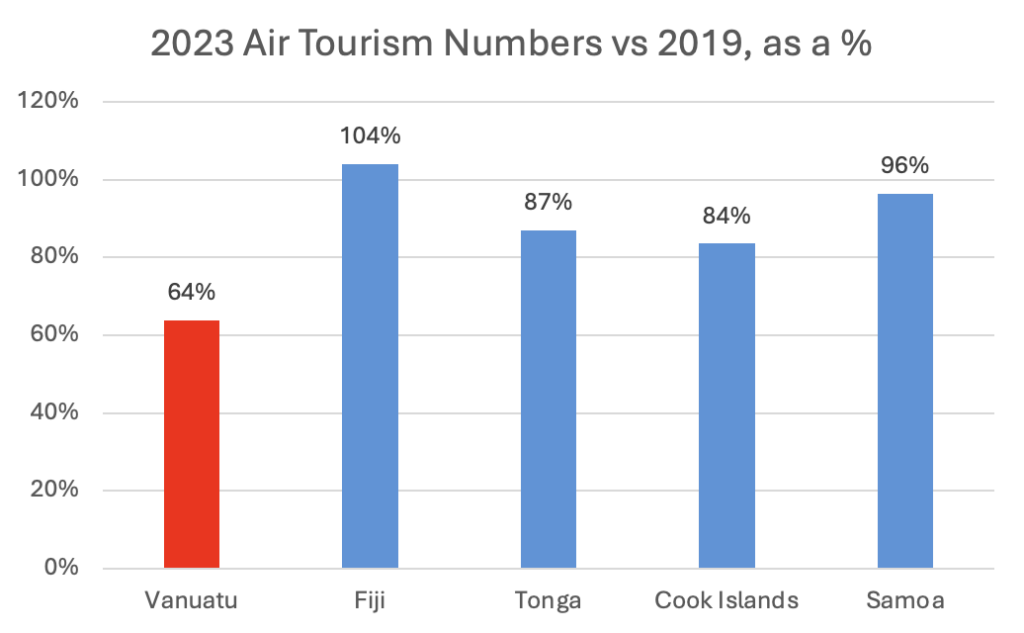
Of course, the economic impacts go beyond just the tourism sector. Other businesses are increasingly reluctant to travel – including solar and water businesses. In these examples, poor air connectivity is stopping some of the most basic foundations of development from reaching rural Vanuatu.
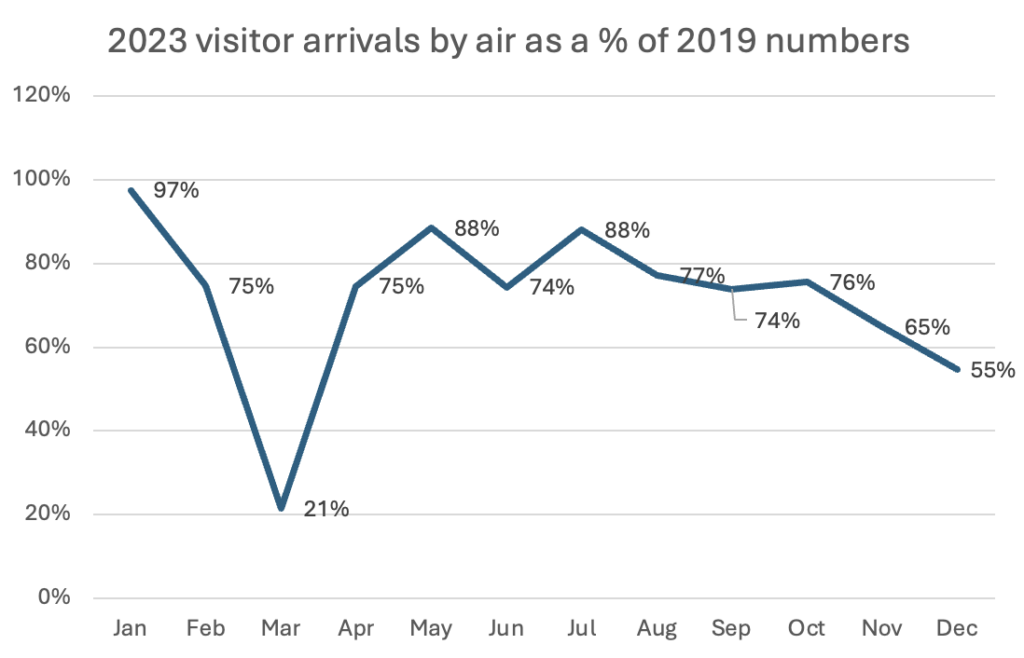
The unreliability has also made doing business harder and more expensive. Import and export of goods by air, especially internationally, has become extremely challenging. This is a major issue for a few key sectors and businesses who rely on being able to reliably import goods that Vanuatu does not produce.
It is also extremely damaging for business confidence, and was commonly cited as a major reason for why potential new investors were being put off. This is at a time when Vanuatu desperately needs new investment.
It is also bad for Vanuatu’s foreign exchange position – in 2019 tourism receipts were VUV 33,500m (USD 295m), far outstripping merchandise (goods) exports (VUV 5bn), although of course merchandise exports have lower leakage (money/profits flowing out). Fewer tourists means less foreign exchange flowing in.
Air Vanuatu is also proving to be extremely costly for the Government – both in terms of time and money. The Government had allocated VUV 2 billion for new aircraft this year, but by March they had already spent 60% of that on simply keeping the lights on and the plane flying. This VUV 1.2 billion is the equivalent of roughly 1% of GDP. This is a huge amount of money for the Government to be spending on something which is not an investment and is clearly not sustainable. The longer these issues go on for, the more and more expensive Air Vanuatu will prove to be.
Vanuatu is also very limited in terms of human resources. The authorities face a wide range of other challenges and obligations, including in core areas such as health, education, and infrastructure. Air Vanuatu is currently using up a lot of time in an unproductive manner.
These problems have been going on for at least 18 months, and Vanuatu simply cannot afford to wait any longer for a fix.
It is a headache that can be removed, however. There is no foundational reason as to why the Government has to provide air connectivity – unlike say justice which simply must be provided by the state.
Indeed, there is no reason why the private sector cannot provide this service – Air Vanuatu was profitable in 2016, 2017, and 2019, and saw a rapid growth in revenue over this period. Vanuatu also immense potential– local demand is growing, Vanuatu is so close to large markets, and there is growing demand for adventure and sustainable tourism – an area in which the country can certainly thrive. A well-run airline could certainly make good money.
The new Articles of Association are a good start, giving the board more independence, but until the fundamentals of the company are fixed (availability of airline, sustainability of debts, etc.), then Air Vanuatu will remain in the Government’s in-tray. It is clear that it will require a political solution.
One possible idea is for the Government and new board to get the airline to a far stronger position via a major cash injection, at which point it could sell 51% to a large airline, who would then be expected to invest and run it profitably and reliably. This would completely eliminate the day-to-day issues of Air Vanuatu for the Government, as well as bring in foreign skills, knowledge, and investment, while keeping the international capacity within Vanuatu.
If done well, it has the potential to transform both business confidence and the economy within a very short timeframe unlike anything else – and for this reason is surely worth exploring. The major downside is that of course this would be very expensive.
However, this is simply a high-level idea that is light on details. The main purpose of this article is not to provide a comprehensive fix, but to reiterate as strongly as possible that businesses needed a permanent solution for Air Vanuatu yesterday. Doing so will also enable everyone in Vanuatu get on with the rest of the development journey, something that is surely needed at a time of such international stress.

This is part of a series of articles by Peter Judge, Director of Economics and Research at Pacific Consulting Limited and author of the recent VCCI Private Sector Economic Outlook. The purpose of the series is to spark debate and further ideas, noting much more work is needed. All views expressed are solely his own.


